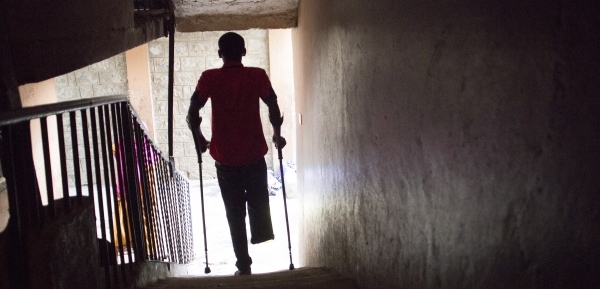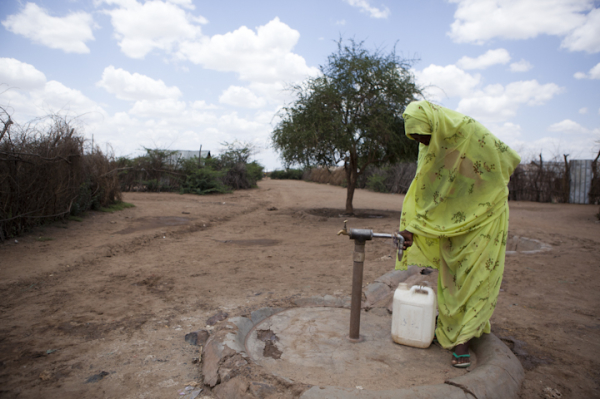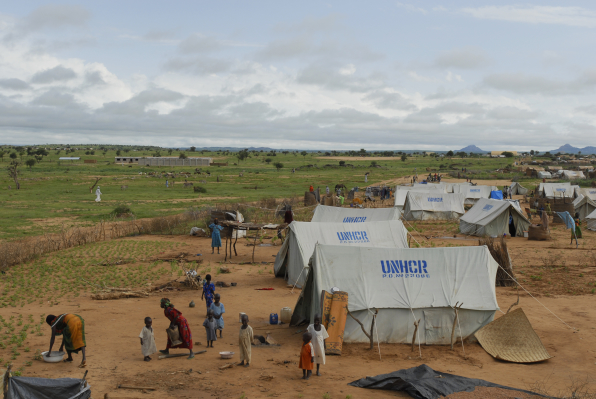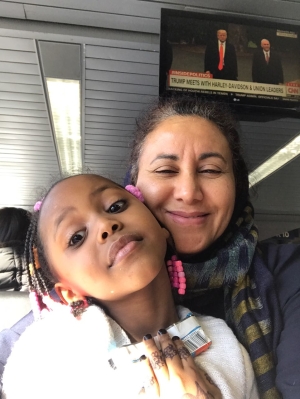
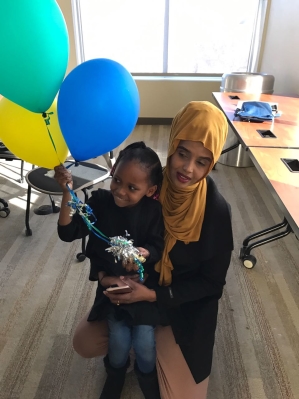
Image: 4-year old Mushkaad is finally reunited with her mother Samira in the U.S., after two years of separation.
“How do you explain to the little girl that she will no longer be going to see her mother? How do you explain to the mother who anxiously has been waiting for her child that she will no longer see her 4-year old daughter?”
During the past few days we have been sharing stories of refugee families impacted by the recent executive order suspending the U.S. resettlement program, as told by RefugePoint Resettlement Experts. Many things have developed since Friday, when a federal judge from Washington state temporarily blocked enforcement of the travel ban, which allowed people who had been previously banned from travelling to board planes bound for the U.S.
Today, we share with you a special story of Mushkaad, A 4-year old Somali girl, as told to us by a RefugePoint Kenya board member, Sheikha Ali, who served as Mushkaad’s travel companion as she attempted and re-attempted her journey to reunite with her family in the U.S. after two years of separation.
Flight Cancelled
On January 27, Mushkaad, A 4-year old Somali girl wearing a beautiful white dress, and with her hair specially done up, was ready to finally board a plane and fly to Minnesota where she would reunite with her mother after two years of separation.
Sheikha Ali, a RefugePoint board member who is an employee of the International Organization for Migration (IOM), met the little girl in Kampala, Uganda, on the day of the flight. But the executive order had just gone into effect and Sheikha had to tell the girl that her flight had been cancelled.
“How do you explain to the little girl that she will no longer be going to see her mother?” said Sheikha, “How do you explain to the mother who anxiously has been waiting for her child that she will no longer see her 4-year old daughter?”
A Terrible Decision
Mushkaad’s mom, Samira, had to make a terrible decision years earlier. Samira and her two young daughters had been approved for resettlement before Mushkaad was born. When they were ready to travel Mushkaad was almost a year old, but the mom was told that since Mushkaad was not part of the original family composition when they were approved for resettlement, there would be delays to add Mushkaad. The mom left Mushkaad in the hands of a close friend, traveled to Minnesota with her two young daughters, and immediately filed paperwork to bring Mushkaad to join her.
Minnesota Senators Get Involved
When Sheikha told Mushkaad she couldn’t get on the plane last week, her response was, “are you going to undo my hair now that I’m not going?”
Sheikha contacted the US Refugee Coordinator who relayed the information to the State Department. At the same time Senators Al Franken and Amy Klobuchar in Minnesota had known about the case and contacted the new Secretary for Homeland Security, John Kelly, when they learned Mushkaad was stopped from traveling.
When Mushkaad finally got clearance to travel, Sheikha didn’t waste a moment, knowing the uncertainty of the situation. “I didn’t even have time to pack or prepare, I just went and got Mushkaad and brought her to the airport and we both got on the plane.”
Preparing for a Fight
Sheikha worried about US immigration officials in Abu Dhabi, the country through which she and Mushkaad were transiting. Would they try to send Mushkaad back like so many others who had been turned away at US borders? Sheikha said she started preparing herself for a fight.
When Sheikha and Mushkaad stepped up to the immigration desk, the officer asked Sheikha who the little girl was. When Sheikha explained the story, the officer was touched. Sheikha said, “He stepped out from behind his desk. He removed his US flag pin from his uniform and asked if he could pin it on Mushkaad. He apologized for what was going on. He said knowing that this little girl was going to reunite with her mother made his day.” Sheikha went on to say, “that man reaffirmed my faith in America and in humanity.”
Arrival
On Friday, February 3, Sheikha arrived in Minnesota where Mushkaad finally reunited with her mom and two older sisters.
RefugePoint has worked for more than a decade now to help the U.S. resettlement program become as robust as possible so that mothers and their daughters and families can find safety here in the U.S., and elsewhere. Thanks in part to our efforts, as well as those of many others, there are tens of thousands of refugees who were ready to travel when the executive order was signed temporarily suspending the program. We hope that stories like this one can help sway our new administration to continue the U.S. resettlement program with the strength and vision it has always had.
Cover: RefugePoint Kenya board member Sheikha Ali serves as a travel companion for Mushkaad during her journey from Uganda to the U.S.


Image: 4-year old Mushkaad is finally reunited with her mother Samira in the U.S., after two years of separation.
“How do you explain to the little girl that she will no longer be going to see her mother? How do you explain to the mother who anxiously has been waiting for her child that she will no longer see her 4-year old daughter?”
During the past few days we have been sharing stories of refugee families impacted by the recent executive order suspending the U.S. resettlement program, as told by RefugePoint Resettlement Experts. Many things have developed since Friday, when a federal judge from Washington state temporarily blocked enforcement of the travel ban, which allowed people who had been previously banned from travelling to board planes bound for the U.S.
Today, we share with you a special story of Mushkaad, A 4-year old Somali girl, as told to us by a RefugePoint Kenya board member, Sheikha Ali, who served as Mushkaad’s travel companion as she attempted and re-attempted her journey to reunite with her family in the U.S. after two years of separation.
Flight Cancelled
On January 27, Mushkaad, A 4-year old Somali girl wearing a beautiful white dress, and with her hair specially done up, was ready to finally board a plane and fly to Minnesota where she would reunite with her mother after two years of separation.
Sheikha Ali, a RefugePoint board member who is an employee of the International Organization for Migration (IOM), met the little girl in Kampala, Uganda, on the day of the flight. But the executive order had just gone into effect and Sheikha had to tell the girl that her flight had been cancelled.
“How do you explain to the little girl that she will no longer be going to see her mother?” said Sheikha, “How do you explain to the mother who anxiously has been waiting for her child that she will no longer see her 4-year old daughter?”
A Terrible Decision
Mushkaad’s mom, Samira, had to make a terrible decision years earlier. Samira and her two young daughters had been approved for resettlement before Mushkaad was born. When they were ready to travel Mushkaad was almost a year old, but the mom was told that since Mushkaad was not part of the original family composition when they were approved for resettlement, there would be delays to add Mushkaad. The mom left Mushkaad in the hands of a close friend, traveled to Minnesota with her two young daughters, and immediately filed paperwork to bring Mushkaad to join her.
Minnesota Senators Get Involved
When Sheikha told Mushkaad she couldn’t get on the plane last week, her response was, “are you going to undo my hair now that I’m not going?”
Sheikha contacted the US Refugee Coordinator who relayed the information to the State Department. At the same time Senators Al Franken and Amy Klobuchar in Minnesota had known about the case and contacted the new Secretary for Homeland Security, John Kelly, when they learned Mushkaad was stopped from traveling.
When Mushkaad finally got clearance to travel, Sheikha didn’t waste a moment, knowing the uncertainty of the situation. “I didn’t even have time to pack or prepare, I just went and got Mushkaad and brought her to the airport and we both got on the plane.”
Preparing for a Fight
Sheikha worried about US immigration officials in Abu Dhabi, the country through which she and Mushkaad were transiting. Would they try to send Mushkaad back like so many others who had been turned away at US borders? Sheikha said she started preparing herself for a fight.
When Sheikha and Mushkaad stepped up to the immigration desk, the officer asked Sheikha who the little girl was. When Sheikha explained the story, the officer was touched. Sheikha said, “He stepped out from behind his desk. He removed his US flag pin from his uniform and asked if he could pin it on Mushkaad. He apologized for what was going on. He said knowing that this little girl was going to reunite with her mother made his day.” Sheikha went on to say, “that man reaffirmed my faith in America and in humanity.”
Arrival
On Friday, February 3, Sheikha arrived in Minnesota where Mushkaad finally reunited with her mom and two older sisters.
RefugePoint has worked for more than a decade now to help the U.S. resettlement program become as robust as possible so that mothers and their daughters and families can find safety here in the U.S., and elsewhere. Thanks in part to our efforts, as well as those of many others, there are tens of thousands of refugees who were ready to travel when the executive order was signed temporarily suspending the program. We hope that stories like this one can help sway our new administration to continue the U.S. resettlement program with the strength and vision it has always had.
Cover: RefugePoint Kenya board member Sheikha Ali serves as a travel companion for Mushkaad during her journey from Uganda to the U.S.

